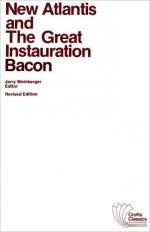|
This section contains 3,064 words (approx. 11 pages at 300 words per page) |

|
SOURCE: "Reading Bacon: The Pathos of Novelty," in Francis Bacon and Modernity, Yale University Press, 1986, pp. 173-204.
In the excerpt below, Whitney analyzes several aspects of the society described in the New Atlantis, concluding that Bacon's description of the interaction between tradition and discovery within a utopia reflects issues of power and authority in both Bacon's time and the present.
[F]reudian processes are pertinent to Bacon's New Atlantis, where modern consciousness is symbolized by the island of Bensalem, "a land unknown." The New Atlantis is different. Surprisingly, because it is a fable, this utopia's relationship to reality is easier to grasp than that of [other] nonfiction works of Bacon…. For since Bacon's special problem is the relation of text-bound to text-free truth, an explicitly fictional story offers a relief. The New Atlantis's fictionality and representational simplicity center on the proposition that one civilization in the world never...
|
This section contains 3,064 words (approx. 11 pages at 300 words per page) |

|


